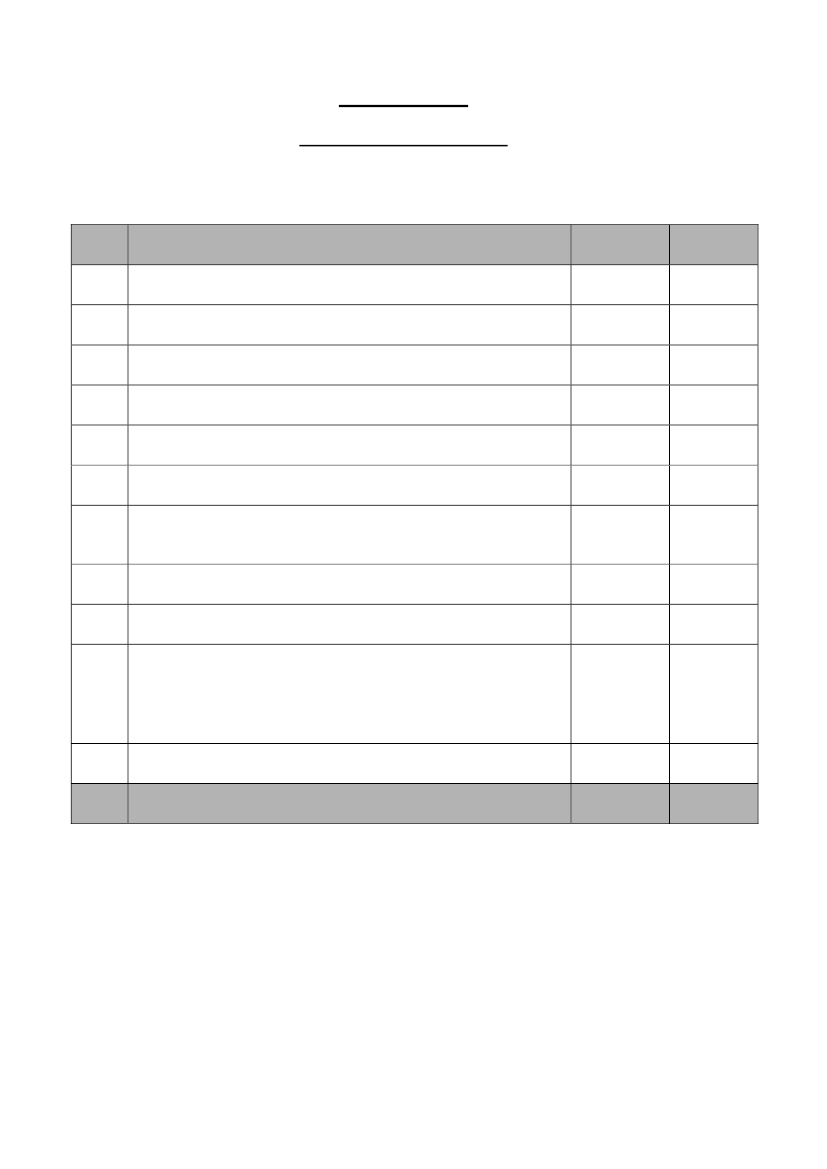OSCEs parlamentariske Forsamling 2008-09
OSCE Alm.del Bilag 58
Offentligt
RULES OF PROCEDURE
29 June 2009
TABLE OF CONTENTSPART IComposition, Aims, Membership and Officers of the AssemblyRule 1:Rule 2:Rule 3:Rule 4:Rule 5:Rule 6:Composition of the AssemblyResponsibilities and Objectives of the AssemblyMembershipOfficers of the AssemblyElection of OfficersBureau
PART IIDuties of the President, Discipline and OrderRule 7:Rule 8:Rule 9:Rule 10:PresidentVice-PresidentsMaintenance of OrderPublic Order in the Chamber and Galleries
PART IIISessions and MeetingsRule 11:Rule 12:Rule 13:Rule 14:Rule 15:Rule 16:Rule 17:Rule 18:Rule 19:Annual SessionsWinter MeetingsFall MeetingsMediterranean ForumExtraordinary SessionsAgendaMinutes of ProceedingsReports of DebatesRegister of Attendance
-2-
PART IVQuestions, Rules of Debate and VotingRule 20:Rule 21:Rule 22:Rule 23:Rule 24:Rule 25:Rule 26:Rule 27:Rule 28:Rule 29:Rule 30:Rule 31:Rule 32:Rule 33:Rule 34:QuestionsSupplementary ItemsAmendmentsCompromise AmendmentsValidation of SignaturesProcedural MotionsUrgencyRight to SpeakLanguages of the AssemblyInterpretationOrganisation of DebatesRight to VoteMethods of VotingMajoritiesQuorum
PART VCommitteesRule 35:Rule 36:Rule 37:Rule 38:Rule 39:Standing CommitteeGeneral CommitteesPowers and Duties of CommitteesProcedure in General CommitteesReports of General Committees
PART VIOrganisation of the AssemblyRule 40:Rule 41:SecretariatBudget and Finance
-3-
PART VIIRelations with Outside Bodies and IndividualsRule 42:Rule 43:Rule 44:Relations between the Assembly and the Ministerial CouncilRelations between the Assembly and National ParliamentsObservers
PART VIIIRules of ProcedureRule 45:Amendment of Rules of Procedure
APPENDIXComposition of the Assembly
-4-
RULES OF PROCEDURE OF THE ASSEMBLYPART IComposition, Aims, Membership and Officers of the Assembly
RULE 1Composition of the Assembly1. The Assembly shall be composed of members of parliament from countries which have signed theHelsinki Final Act (1975) and the Charter of Paris (1990) and are participating in the Organizationfor Security and Cooperation in Europe.2. In accordance with Articles 1 and 13 of the Final Resolution of the Madrid Conference concerningthe establishment of the CSCE Parliamentary Assembly, the Assembly shall be composed ofparliamentarians as set out in the Appendix to these Rules of Procedure.3. The composition of the Assembly may be varied by a decision of the Assembly on proposal of theStanding Committee.4. Each national Delegation should have both genders represented.
RULE 2Responsibilities and Objectives of the AssemblyThe Parliamentary Assembly of the OSCE shall:(a) assess the implementation of the objectives of the OSCE;(b) discuss subjects addressed during meetings of the Ministerial Council and the summits of Heads ofState or Government;(c) develop and promote mechanisms for the prevention and resolution of conflicts;(d) support the strengthening and consolidation of democratic institutions in the OSCE participatingStates;(e) contribute to the development of the institutional structures of the OSCE and of relations and co-operation between the existing OSCE institutions.
-5-
RULE 3Membership1. Members of the Assembly shall be Members of their National Parliaments. If they cease to be so,they may continue to be Members of the Assembly until a successor has been designated or, in theabsence of such designation, for a maximum of six months.2. Members of the Assembly shall be appointed by their National Parliaments. Parliaments may also,in addition to Members as provided by Rule 1, appoint alternate Members whose numbers shall notexceed the number of the Members. An alternate Member may take the place of a Member who isunable to attend a Session or Committee meeting of the Assembly and when the Secretariat hasbeen duly informed of this by the Head of Delegation.3. The credentials of Members shall be verified on the basis of official documents or communicationssupplied by their National Parliaments.4. If the credentials of a Member are challenged, the President shall appoint a Credentials Committeewhich shall report its recommendations forthwith to the Bureau or the Standing Committee fordecision.
RULE 4Officers of the Assembly1. The Officers of the Assembly shall consist of the President, nine Vice-Presidents and the Treasurer.2. The President for the forthcoming year shall be elected by the Assembly before the close of theAnnual Session.3. The retiring President shall, ex officio, hold office as President Emeritus until the election of aPresident subsequent to his or her successor. The Vice-Presidents shall be elected by the Assemblyimmediately following the election of the President.4. The Treasurer shall be elected in the same manner.5. Candidates for the offices of President, Vice-President or Treasurer must be sponsored in writing bytwenty-five or more Members and their candidatures verified by the Bureau, prior to submission tothe Assembly.6. The President shall hold office from the close of the Annual Session in which he or she is elected tothe close of the next Annual Session.7. The Vice-Presidents shall hold office from the close of the Annual Session in which they areelected to the close of the third Annual Session thereafter, except when they are elected to fill avacancy of an unexpired term.
-6-
8. The Treasurer shall hold office from the close of the Annual Session in which he or she is elected tothe close of the second Annual Session thereafter.9. In considering proposed candidates for the Offices of President, Vice-President and Treasurer, theAssembly shall take account of the national composition of the Assembly.
RULE 5Election of Officers1. The President shall be elected by secret ballot and each Member entitled to vote may cast one vote.If, on the first ballot, no candidate has obtained an absolute majority of the votes cast, a secondballot shall be held between the two candidates who obtain the most votes in the first ballot. Thecandidate who, on the second ballot, obtains the most votes shall be elected. In the event of a tie,the issue shall be decided by lot.2. The Vice-Presidents shall also be elected by secret ballot. Each Member entitled to vote may cast asmany votes as there are positions to be filled. The three candidates who obtain the most votes shallbe elected for three years. If there are unexpired terms to be filled the candidates receiving the nexthighest number of votes shall be elected. In event of a tie the matter shall be decided by lot.3. The Treasurer shall be elected by secret ballot, in accordance with the procedure provided inparagraph 1 above.4. Whenever, in an election, the number of candidates is the same or less than the number of positionsto be filled, the candidates shall be declared to be elected by acclamation.5. The Officers shall be elected by those Members present and entitled to vote in accordance with theprovisions of Rules 30 to 33 below. All ballot papers bearing the names of persons who have beenduly nominated as candidates shall be taken into account for the purpose of calculating the numberof votes cast.6. The President may be re-elected only once to the same office. The Vice-Presidents may be re-elected once to the same office. The Treasurer may be re-elected twice to the same office.7.The Vice-President who has obtained the highest number of votes among the Vice-Presidents with
greatest length of service, and, at a parity of votes, the eldest of them, may act as President whenthe latter is unable to exercise his or her functions, until the Assembly elects a successor.8.When a Vice-President ceases to be a Member of Parliament but continues to be a Member of the
Assembly in accordance with Rule 3(1), he or she will have to resign as Vice-President before thebeginning of the Annual Session in order to allow the Assembly to elect another Member to replacehim or her for the rest of his or her term.9.If, for any reason, the Treasurer is unable to exercise his or her functions before or during the period
of his or her mandate, the President shall act as Treasurer until such a time as a successor shall beelected by the Assembly at its next meeting and he or she shall hold office until the expiry of themandate in question.-7-
RULE 6Bureau1. The Bureau shall consist of the President, the Vice-Presidents and the Treasurer, the Officers of thethree General Committees and the President Emeritus. The President Emeritus shall, ex officio, bea non-voting Member of the Bureau.2. The Bureau shall meet at the invitation of the President, or at the request of two-thirds of the votingMembers of the Bureau. The President shall take the Chair of the Bureau. In the absence of thePresident, a Vice-President designated by the President shall take the chair and may exercise thesame rights. In the absence of such designation, the Chair shall be held by the Vice-Presidentqualified under Rule 5, Paragraph 7.3. The Bureau shall be responsible for ensuring that the decisions of the Standing Committee arecarried out, and ensure the efficient operation of the Assembly in between meetings of the StandingCommittee, including approval of the annual audited accounts. It shall consider the preparations forthe Annual Sessions, Winter and Fall Meetings and for Extraordinary Sessions.4. The Bureau shall take decisions by two-thirds majority of the votes cast.5. Unless the Bureau decides otherwise, its meetings shall be closed to the public.
-8-
PART IIDuties of the President, Discipline and Order
RULE 7President1.The duties of the President shall be to call and preside over meetings of the Assembly; to guide thedebates of the Assembly; to ensure observance of the Rules, maintain order, call on speakers, openand close debates, ascertain whether a quorum exists, put questions to the vote and announce theresults of votes; to perform a similar role in relation to the Standing Committee, and the Bureau, torefer business to the appropriate Committees and to act as the highest representative of theAssembly.2. When chairing the Assembly, the President shall not speak in the debate. If he or she speaks in adebate on a particular subject, the President may not resume the Chair until that debate is over.When the President himself or herself is not in the Chair, he or she shall designate a Vice-Presidentto preside in his or her place until such time as he or she resumes the Chair.3. The duties of the President shall also include to initiate and undertake contacts and dialogue as wellas participate in meetings and fora which would promote the aims and policies of the Assembly. Inthe performance of these duties the President may appoint, at the appropriate level, others to assistor act on his or her behalf. Such persons will report to the President. The President will report onthese activities to the Standing Committee.
RULE 8Vice-PresidentsWhen chairing the Assembly, the Vice-President shall perform the same duties as the President. He orshe shall also be subject to the restriction in Rule 7(2) above.
RULE 9Maintenance of Order1. The President shall call to order any Member of the Assembly who causes a disturbance during theproceedings.2. If the offence is repeated, the President shall again call the Member to order and cause the fact to berecorded in the Minutes of Proceedings.
-9-
3. In the event of a further offence, the President may, after naming him or her, exclude the offenderfrom the Chamber for the remainder of the sitting.4. In serious cases the President may propose that the Assembly pass a vote of censure, which shallinvolve immediate exclusion from the Chamber of a named Member for the remainder of thesession. The Member upon whom a vote of censure is proposed shall have the right to be heard.5. The vote of censure shall be taken without debate by show of hands.6. Words or expressions whose meaning bears an affront to the dignity of peoples, or which areotherwise contrary to the good conduct of debates or cast aspersions on the honourable behaviour ofMembers shall not be in order.
RULE 10Public Order in the Chamber and Galleries1. No person shall enter the Chamber for any reason, except Members, Members of the MinisterialCouncil, Members of the staff whose duties require their presence there, and invited guestsapproved by the President.2. The persons duly invited by the Assembly or the President shall be admitted to the galleries.3. Members of the Public admitted to the galleries shall remain seated in silence. Any person acting incontravention of this Rule shall be ejected by order of the President.
- 10 -
PART IIISessions and Meetings
RULE 11Annual Sessions1. The Assembly shall meet once a year in an Annual Session for no more than five days during thefirst ten days of July.2. The dates, duration and location of the Annual Sessions shall be determined by the StandingCommittee and normally brought to the attention of Members six months in advance and, in anycase, not less than four months beforehand by the Secretariat.3. An Annual Session shall consist of meetings of the Standing Committee, General Committees andplenary meetings of the Assembly.4. The Annual Session shall sit in public unless it otherwise orders.
RULE 12Winter Meetings1. The Assembly shall meet once a year in a Winter Meeting for no more than three days during thefirst two months of the year.2. Unless the Standing Committee decides otherwise, the Winter Meeting will take place in Vienna.3. The Winter Meeting shall consist of meetings of the Standing Committee and the GeneralCommittees of the Assembly.4. The Winter Meeting shall sit in public unless it otherwise orders.
RULE 13Fall Meetings1. The Assembly shall hold its Fall Meetings once a year for no more than three days.2. The Fall Meetings shall consist of meetings of the Standing Committee and SpecialConferences.
- 11 -
3. The Fall Meetings shall take place in one of the OSCE participating or Partner States, asdecided by the Standing Committee.4. The Fall Meetings shall be open to the public, unless a meeting decides otherwise.
RULE 14Mediterranean ForumThe Assembly shall hold a Mediterranean Forum once a year, preferably in conjunction with one ofthe other statutory meetings of the Assembly.
RULE 15Extraordinary SessionsThe Assembly may be convened in Extraordinary Session by the President at the request of theStandingCommittee.
RULE 16Agenda1. There shall be an Agenda of the Annual Session, proposed by the President, after consultation withthe Bureau, for approval by the Standing Committee. The Assembly may amend the Agenda. Thefinal Agenda shall be adopted by the Assembly. The President shall also propose an Agenda for theWinter Meeting and the Fall Meetings. The Standing Committee at the Winter Meeting and theFall Meetings will approve its agenda on the proposal of the President. The General Committeesduring the Winter Meeting will approve their agendas on the proposal of their Chairs. The Bureaumay also propose issues to be included in the agendas of the General Committees. The draftagendas, proposed by the Bureau and the Chairs, will be communicated to the National Delegationsnormally six weeks before the opening of the Annual Session or the Winter and Fall Meetings.2. The Agenda of each Annual Session shall include consideration of the reports of the three GeneralCommittees and approval of their draft resolutions.3. Each substantive Agenda item of the Annual Session shall concern issues relevant to the OSCEProcess.4. The General Rapporteur of each General Committee shall submit to the Annual Session a report onthe subject area accompanied by a draft resolution 6 weeks before the Annual Session. TheInternational Secretariat, after having translated the reports and the draft resolutions into all sixOSCE languages, shall communicate these documents to all National Delegations for distribution totheir Members.- 12 -
5. The Agendas of each Winter Meeting shall include reports from the Ministerial Council and seniorOSCE officials. It will also include an evaluation of the activities of the OSCE. The Winter Meetingmay also discuss other issues relevant to the OSCE.6. The General Committees will not pass political resolutions during the Winter Meetings, but theymay propose such resolutions to be passed by the Standing Committee.
RULE 17Minutes of ProceedingsThe Minutes of Proceedings of the Annual Sessions, Winter Meetings, Extraordinary Sessions, theStanding Committee, the Bureau, and the General Committees, recording attendance and decisionsreached, shall be kept by the Secretariat. Upon completion, National Delegations will receive a copy ofthese minutes.
RULE 18Reports of DebatesA summary report of debates in the plenary session, recording subjects addressed and Membersparticipating will be kept by the Secretariat.
RULE 19Register of attendanceEach National Delegation shall submit an official list of its Members to the Secretariat before eachAnnual Session, Winter Meeting, Fall Meetings and other meetings.
- 13 -
PART IVQuestions, Rules of Debate and Voting
RULE 20Questions1. Members of the Assembly may put questions to the OSCE Ministerial Council or to any otherMinister addressing the Assembly.2. The questions must be signed by a Member, and must be communicated to the President prior to theaddress, or, at the discretion of the President, taken orally after the address.3. The President of the Assembly will decide on the orderliness of questions. The President will alsodetermine the order in which questions are called.4. There will be a time limit of five minutes for the putting and answering of a question.5. When a question is not reached in the question and answer session, the Secretariat shall make everyeffort to ensure that a written reply is obtained. The President may decide to distribute the reply toNational Delegations.6. A delegation may submit, through the International Secretariat, one written question a year – ofmaximum 300 words – to be answered by the Chairman-in-Office within 6 weeks. When a writtenquestion stays unanswered, the President of the OSCE PA shall focus the attention of the OSCEChairmanship upon it and report back to the Assembly at its next meeting.
RULE 21Supplementary Items1. The agenda of the Annual Session may be supplemented by an item or a motion on any matterwithin the competence of the OSCE, which does not relate directly to subjects proposed by theGeneral Rapporteurs to the three General Committees. Such supplementary item shall be in a formof a draft resolution and it shall be received at the Secretariat at least twenty-one days before theopening of the first plenary session with signatures of at least twenty Members representing at leastfour different countries. The first signatory of a supplementary item will be its principal sponsor.The Standing Committee shall decide by a two-thirds majority of the votes cast whether to include asupplementary item on the agenda of the Annual Session. The Standing Committee shall thendecide by a majority of votes cast whether to refer a supplementary item to the competentCommittee or to submit it to the plenary.
- 14 -
2. If more than one supplementary item is presented on the same issue, the President may ask theprincipal sponsors of the draft resolutions on the same issue to hold consultations in order to presenta compromise draft resolution. If such a compromise draft resolution is received at the Secretariat atleast fourteen days before the opening of the first plenary session with signatures of the principalsponsors and at least ten signatories of each of the two or more draft resolutions in question, it shallbe presented to the Annual Session as a supplementary item and all other draft resolutions on thesame issue shall fall. The principal sponsor of the draft resolution which was received first shall bethe principal sponsor of the compromise draft resolution. If there is no agreement on a compromisedraft resolution, the draft resolution which was received first shall be presented to the AnnualSession and others on the same issue shall fall.
RULE 22Amendments1. Amendments to the draft resolutions presented by the General Rapporteurs or to supplementaryitems shall be submitted in writing and signed by at least five Members representing at least twoOSCE countries. Amendments to the draft resolutions prepared by the General Rapporteurs shall bereceived at the Secretariat with the required signatures at least fourteen days before the opening ofthe first plenary session. Amendments to supplementary items shall be received at the Secretariatwith the required signatures at least seven days before the opening of the first plenary session. Thefirst signatory of an amendment will be its principal sponsor.2. The Amendments will be considered in the same Committee in which the resolution, orsupplementary item, to which the Amendment relates, is considered. The Chair of the Committeeshall decide whether the Amendment is in order. If the Chair decides that the Amendment is not inorder because it is not relevant to the Committee’s area of competence or is not a compromiseamendment in accordance with Rule 23, any sponsor of that Amendment may refer the matter to thePresident. The President will determine which Committee is competent to deal with theAmendment.3. Each Amendment may only relate to one paragraph.4. The Amendments are put to the vote before the text to which they relate and following the order ofparagraphs of the said text.5. If two or more Amendments relate to the same paragraph, they will be voted upon according to theorder in which they appear in the initial text starting with entirely suppressive Amendmentsfollowed by partially suppressive, modified and additional Amendments.6. One sponsor may move an Amendment.7. The Chair may group the Amendments for discussion in the order outlined in paragraphs 4 and 5.The sponsors of such Amendments will be called upon in turn to present their respectiveAmendments.
- 15 -
8. When Amendments are being considered, unless the Chair decides otherwise, the only Memberswho may speak shall be the mover of the Amendment, or another Member speaking in its favour,one Member opposed to the Amendment and the General Rapporteur or the Committee Chair.Members shall speak for no more than five minutes.9. The procedure foreseen for the examination of Amendments by the General Committees is alsoapplicable for the Assembly as far as Amendments to supplementary items submitted directly to theAssembly are concerned.
RULE 23Compromise Amendments1. A compromise amendment may be submitted in writing and signed by at least ten Members,representing at least three OSCE countries, including at least two principal sponsors of amendmentsalready submitted in accordance with Rule 22 on the same issue to the same draft resolution. Anycompromise amendment shall be submitted no later than 10 a.m. on the day before the Assembly orrelevant Committee starts consideration of amendments.2. Voting on compromise amendments will take place before voting on amendments, which theyintend to replace. If the compromise amendment carries, the original amendments, which were thesubject of the compromise, will be dropped.
RULE 24Validation of SignaturesThe signatures of Members of the Assembly who signed a supplementary item or an amendment arevalid provided they register for the Annual Session.
RULE 25Procedural Motions1. At the plenary, Standing Committee or General Committee, if the Chair is willing to accept such amotion, a Member shall have a prior right to speak having made a motion:(a) to postpone the consideration of an item;(b) to remove an item from the agenda;(c) to suspend the sitting;(d) to close the debate.
- 16 -
None of these procedural motions may be moved more than once during the course of a sitting.2. Any of the above motions, if accepted by the Chair, shall take precedence over the main question,the debate on which shall be suspended while they are being considered.3. In the debate on the above matters, the following only shall be heard: the proposer of the motion,one speaker against the motion, and the General Rapporteur or the Chair of the General Committeeor another competent Committee concerned.4. A majority of two thirds of the votes cast is required for the motion under this Rule to be adopted.5. In addition, a Member shall have a prior right to speak if he or she asks leave to raise a point oforder. A point of order must be confined to raising only questions of procedure for a ruling from theChair. The time limit for points of order shall be one minute.6. When a supplementary item in the plenary or competent Committee is postponed to the followingyear’s Annual Session, all amendments, made in accordance with Rule 22, are withdrawn. Duringthe following year’s Annual Session the Standing Committee will consider the postponedsupplementary item in accordance with the provisions of Rule 21.1. New amendments for thefollowing year’s Annual Session may be presented in accordance with Rule 22.
RULE 26Urgency1. Questions of urgency may be placed on the agenda of the Assembly at any time on the proposal ofthe Standing Committee, or in the absence of a meeting of the Standing Committee, on the proposalof the Bureau. Such questions of urgency must be pertinent to the OSCE process and relate to anevent which has taken place or come to public knowledge less than twenty-four days before theopening of the first plenary session.2. Such question of urgency shall be in a form of a draft resolution and it shall be signed by at leasttwenty-five Members representing at least ten countries. The first signatory of the draft resolutionshall be the principal sponsor of the question of urgency.3. In the event of the Standing Committee or the Bureau deciding not to recommend the inclusion ofsuch an item on the agenda, the proposers shall have the right to appeal in writing to the Assembly,which may decide by a majority of two thirds of the Members of the Assembly to place theproposal on the agenda.
RULE 27Right to Speak1. No Member may speak unless called upon to do so by the President. Members shall speak fromtheir place and shall address the Chair; the President may invite them to come to the rostrum.
- 17 -
2. Except for the Chair and General Rapporteur of the General Committee, Members wishing to speakin a general debate shall enter their names in a register provided for the purpose at the latest beforethe opening of each sitting. In all cases, the Chair shall determine the order in which Members shallbe called to speak. The Chair may close the list when the number of speakers multiplied by fiveminutes exceeds the time available for the session. Alternatively, the Chair may reduce the timelimit for each speaker to less than five minutes in order to allow more Members to participate in thedebate.3. A speaker may not be interrupted. He or she may, however, with the permission of the Chair, giveway during his or her speech to allow another Member to put to him or her a question on aparticular point in his or her speech. Interventions under this procedure must be short. Any pointof order shall be taken at the end of a speech.4. If a speaker is irrelevant, the Chair shall call him or her to order. If a speaker has already beencalled to order twice in the same debate, the Chair may, on the third occasion, forbid him or her tospeak during the remainder of the debate on the same subject.5. Members of the Ministerial Council may speak in debates with the permission of the Chair. GeneralRapporteurs on a question under discussion shall be allowed to speak whenever they wish. StaffMembers or others assisting the National Delegations should not speak at official meetings of theAssembly on behalf of a Member or National Delegation.6. The Chair may decide to allow a Member to make a personal statement. There shall be no debateon such a statement.7. Unless the Chair decides to grant additional time, no Member may speak for more than five minutesor for no more than one minute on a point of order.
RULE 28Languages of the AssemblyThe official languages of the Assembly are English, French, German, Italian, Russian and Spanish.
RULE 29Interpretation1. Speeches delivered in one of the official languages shall be simultaneously interpreted.2. Speeches may be made in a language other than one of the official languages. In such cases thespeaker himself or herself shall be responsible for arranging for simultaneous interpretation into oneof the official languages.3. The provisions of this Rule shall also apply to the Standing Committee and the GeneralCommittees.- 18 -
RULE 30Organisation of Debates1.The President may, at his or her discretion, propose to the Assembly a programme and timetable for
a specific debate or time-limits on speeches.2.The Assembly shall vote on such proposals without debate.
RULE 31Right to Vote1. Each Member has a single vote.2. Members shall not vote by proxy.3. A Member who has an unavoidable obligation to leave an Annual Session before the day of theelection of a President, Vice-President and a Treasurer has the right to vote earlier provided that heor she has notified in writing the Assembly President accordingly. Early voting shall start onlywhen all candidates have been duly nominated.
RULE 32Methods of Voting1. The Assembly shall vote by show of hands except in cases where a roll-call vote or secret ballot isrequired. Only affirmative and negative votes shall count in calculating the number of votes cast.The number of abstentions shall be recorded.2. The Assembly shall vote by roll-call when one third of its membership so requests.3. The roll shall be called in French alphabetical order. The Chair shall be responsible for the countingof votes and shall announce the result. The Head of each National Delegation or his or her dulyappointed deputy shall announce the voting of the Delegation. If a National Delegation's vote isquestioned, the Chair shall immediately appoint two tellers, not of that Delegation, to determine thevalidity of the vote that was announced.4. In the case of election of officers, voting will take place in accordance with Rule 5 above. Threetellers shall be appointed by the Chair. All duly appointed candidates or those that represent themhave the right to monitor voting procedure, the counting of the ballot papers and the tabulation ofthe votes in all polling places. Only those ballot papers bearing the names of persons who havebeen duly nominated as candidates shall be taken into account for the purpose of calculating thenumber of votes cast. The Chair shall announce the result.
- 19 -
RULE 33MajoritiesThe majorities required, except as otherwise provided, are the following:(a) a majority of the votes cast;(b) in the case of election of officers, as provided in Rule 5.
RULE 34Quorum1. Decisions in the Assembly, Standing Committee, General Committee or Bureau can only be takenwhen a majority of Members are present. The Chair shall determine the presence of a quorum.2. In the absence of a quorum, the vote shall be postponed. The Standing Committee shall decidewhether the business lost through lack of quorum should be put to the vote at the next session of theAssembly.
- 20 -
PART VCommittees
RULE 35Standing Committee1. There shall be a Standing Committee consisting of the President of the Assembly, the Vice-Presidents, the Treasurer, the Officers of the General Committees and the Heads of NationalDelegations. Members of the Bureau may not vote unless they are acting in the capacity of theHead of a Delegation.2. When a Head of Delegation changes between Annual Sessions, the newly appointed Member maysit on the Standing Committee provided that his or her credentials are verified on the basis ofofficial documents or communication supplied by his or her National Parliament.3. In the absence of the Head of a National Delegation, his or her place may be taken by a dulydesignated Member of the same Delegation, who shall exercise the full powers of a Member of theStanding Committee.4. The Standing Committee shall prepare the work of the Assembly in between sessions, having theright to meet between sessions. It shall take such action as it deems necessary for the activities ofthe Assembly to be carried on during the Assembly's sessions. The Standing Committee may adoptresolutions to be forwarded to the Ministerial Council of the OSCE.5. The Standing Committee may appoint ad hoc Committees for specific purposes, prescribing theirterm of office, composition and mandate.6. Decisions in the Standing Committee shall be taken according to the principle of consensus-minus-one until such time as the Ministerial Council of the OSCE shall agree to act by consensus-minus-two, at which time the Standing Committee shall adopt the same rule.
RULE 36General Committees1. The Assembly shall have at least three General Committees which shall include:(a) The General Committee on Political Affairs and Security;(b) The General Committee on Economic Affairs, Science, Technology and Environment; and(c) The General Committee on Democracy, Human Rights and Humanitarian Questions.
- 21 -
2. Membership of General Committees shall be ratified by the Standing Committee or the Bureau. AllMembers of the General Committees shall be nominated by the National Delegations ensuring abalanced composition of the General Committees. Members of the Assembly shall be Members ofat least one General Committee. In a General Committee each National Delegation will have asmany votes as it would be entitled to if the full number of Members to which it is entitled werepresent. An absent Member’s seat in a General Committee may be taken by another Member of thesame National Delegation. However, no Member may cast more than one vote at a time.3. The Bureau of each General Committee shall be composed of a Chair, Vice-Chair, and GeneralRapporteur. The General Committee Bureau may meet in between sessions of the Assembly.4. Nominations submitted by Heads of Delegations for membership of the General Committees shallbe addressed to the President of the Assembly and shall divide each Delegation by equal numbers tothe extent possible among the General Committees.5.General Committees shall elect a Chair, a Vice-Chair and a General Rapporteur, who are theOfficers of General Committees, at the close of the sitting at each Annual Session for the followingyear. Candidates shall be sponsored in writing. Unless the General Committee decides otherwise,they shall be nominated before the opening of the last scheduled meeting of the General Committeeduring the Annual Session. The General Committee Officers shall be elected by a majority of votescast in a secret ballot. If no candidate has obtained a majority, a second ballot shall be held betweenthe two candidates having obtained the highest number of votes in the first ballot. In the event of atie, the issue shall be decided by lot. If there is only one candidate nominated for an office thecandidate shall be declared elected by acclamation. In the event of a vacancy arising during thecourse of the year, the Standing Committee may appoint a substitute.
6. Where a seat on a General Committee is vacant because a Member ceases to be a Member of theAssembly, it may be provisionally occupied by a Member from the National Delegation to whichthe seat is allotted, the Member being appointed by the Head of that National Delegation.
RULE 37Powers and Duties of Committees1. Committees may examine OSCE issues relevant to their area of competence.2. Committees shall examine all matters referred to them in accordance with Rule 16 above and allproposals and questions submitted to them in pursuance of a decision taken by the Assembly, theStanding Committee, the Bureau or the President.3. General Committees shall examine the reports submitted by the General Rapporteurs and shall actupon the draft resolutions.
- 22 -
4. The Vice-Chair of each General Committee shall be responsible for the preparation of a report onthe follow-up of the resolutions adopted by the General Committee and the ParliamentaryAssembly. These reports shall be presented by the Vice-Chairs at the next Annual Session. ThePresident of the Parliamentary Assembly shall assign the resolutions adopted directly by theAssembly, to an appropriate General Committee for a follow-up report, after having consulted itsChair.
RULE 38Procedure in General Committees1. A General Committee shall meet when convened by its Chair during Annual Sessions,Extraordinary Sessions and Winter Meetings.2. A General Committee may appoint a sub-committee determining its composition and order ofreference. The number of Members of a sub-committee may not exceed a third of the Membershipof the full Committee.3. Any two or more General Committees or sub-committees may hold a joint meeting for theexamination of subjects coming within their competence.4. Rules of the Assembly shall apply to General Committees with the following modification:(a) A General Committee shall vote by show of hands, unless ten Members request a vote by roll-call. The roll shall be called in French alphabetical order.(b) A General Committee may deliberate when one-third of its Members are present, but electionsor the vote on a resolution as a whole shall not be valid unless the majority of the Members ofthe Committee are present.5. The Chair of the General Committee may take part in discussions and may vote, but without havinga casting vote.6. General Committee meetings shall be open unless a General Committee decides otherwise.Members may attend meetings of any General Committee even though they are not Members of it,but they may not vote or take part in its discussions unless the Chair has been officially notified thatthe Member is in fact replacing a Member of the Committee who is unable to be present.7. The conditions in which any person who is not a Member may be heard by a General Committeeshall be decided by that General Committee. If the General Committee agrees, such a person maytake part in the discussions at the discretion of the Chair.8. Minutes of proceedings of each meeting of a General Committee shall be kept.
- 23 -
RULE 39Reports of General Committees1. The General Committees shall elect a General Rapporteur, who shall be responsible for thepreparation of a report for the Committee and for introducing a draft resolution based on the report.The Committee will discuss the report and adopt the resolution for the approval of the Assembly.The final report of a Committee shall comprise a substantive text.2. Only the substantive text is voted upon by the Assembly. It must be presented in the form of a draftdeclaration, based upon resolutions adopted by the General Committees.3. Before the Assembly considers a final text it will be examined by the Drafting Committee,composed of representatives of the three General Committees appointed by the Committee Chairsand such other members as the President may decide. The President appoints the Chair of theDrafting Committee. If the Drafting Committee finds that any recommendations forwarded to it areredundant, repetitive or contradictory, it may alter the text to avoid such redundancies, repetitions,or contradictions.
- 24 -
PART VIOrganization of the Assembly
RULE 40Secretariat1. The Secretary General shall be appointed by the Standing Committee, on the proposal of theBureau. The appointment shall be for five years from the adoption of this Rule and it shall berenewable by a majority vote of the Standing Committee. The Standing Committee will set his orher duties, remuneration and conditions of employment consistent with the annual budget.2. In the exercise of his or her duties, the Secretary General shall be responsible to the President and tothe Assembly.3. The Standing Committee shall confirm the senior appointments made by the Secretary General tothe two posts of Deputy Secretaries General, one of whom shall be designated as Finance Officer.4. The Secretary General and the members of the Secretariat shall not engage in any actionincompatible with their positions as international civil servants.5. The Secretariat shall be located in Copenhagen.
RULE 41Budget and Finance1. It shall be the duty of the Treasurer, assisted by the Secretary General, to present to the StandingCommittee a draft budget for the following financial year. The financial year of the Assembly shallcomprise the period from 1 October until 30 September of the following year.2. The Treasurer shall circulate the draft annual budget to the Standing Committee after it has beendiscussed by the Bureau but not later than thirty days before the opening of an Annual Session. TheStanding Committee shall approve the annual budget, which shall be made available to theAssembly at its Annual Session.3. The audited accounts of the Assembly for the preceding financial year shall be presented to theStanding Committee by the Treasurer within six months of the end of that year.4. In accordance with Article 10 of the Madrid Declaration, as amended by the Committee of Heads ofDelegation on 13 January 1992, national contributions to the Budget of the Assembly shall beapportioned according to the formula used to divide the costs of the intergovernmental OSCE.
- 25 -
5. Where the Assembly's accounts show that a Member country has not made its due contribution for aperiod of 9 months, Members of its delegation shall not be allowed to vote until the contribution hasbeen received.6. The Treasurer and the Secretary General shall be responsible for the financial administration of theAssembly, having the right to sign on behalf of the Assembly in all financial matters.
- 26 -
PART VIIRelations with Outside Bodies and Individuals
RULE 42Relations between the Assembly and Ministerial Council1. Reports of the General Committees and decisions of the Assembly shall be transmitted to theMinisterial Council for their consideration.2. Any Member of the Ministerial Council of the OSCE shall have right of access to the sessions ofthe Assembly, to the Winter Meetings, to the Standing Committee and to General Committees.3. Progress reports or requests from the Ministerial Council may be placed on the Assembly's agenda.4. Members of the Assembly may put written questions to the Chairperson-in-Office, other Membersof the Ministerial Council and Heads of the OSCE institutions, at any time. Such questions shall besent to the President. If the President considers that the question is in conformity with Rule 2 and isnot in violation of the principles expressed in Rule 9.6, he or she will forward it to the person inquestion. The answer, which shall also be communicated to the Member through the President, maybe sent, together with the text of the question, to all National Delegations for information at therequest of the Member. A Member may not present more than three questions during each year. Ifthe number of questions exceeds the recipient’s capability to provide satisfactory answers within areasonable time, the President will take appropriate measures and inform the Standing Committeeabout them.
RULE 43Relations between the Assembly and National ParliamentsReports of the General Committees and decisions of the Assembly shall be transmitted to the NationalParliaments of Member countries by the Secretariat
RULE 44Observers1. Provided notification has been given to the Secretariat, representatives of the followingorganizations may be admitted as observers: the Parliamentary Assembly of the Council of Europe;the Assembly of WEU; the NATO Parliamentary Assembly; the Inter-Parliamentary Union; theEuropean Parliament and the Interparliamentary Assembly of the CIS;2. Parliaments of the States which are Partners for Co-operation of the Organization for Security andCo-operation in Europe may also be admitted as observers.
- 27 -
3. The names of observers under paragraph 1 of this Rule shall be notified to the Secretariat by theparliamentary bodies to which they belong.4. Other persons may be admitted as observers subject to the discretion of the President or theStanding Committee.5. Observers may sit in the Assembly without the right to speak unless invited to do so by thePresident.
- 28 -
PART VIIIRules of Procedure
RULE 45Amendment of Rules of Procedure1. Amendments to the Rules of Procedure shall be proposed by at least eleven Members from at leastthree countries.2. The President may appoint a sub-committee to examine such proposals and make recommendationsto the Standing Committee.3. When the Standing Committee has amended the Rules of Procedure, its decision shall be reportedto the Assembly. National Delegations shall be informed about this decision as soon as possible bythe Secretary General.
- 29 -
APPENDIXComposition of the AssemblyThe numbers of Members representing each country shall be as follows:
COUNTRIESABCDEFGHIUnited States of AmericaRussian FederationGermany, France, Italy and United KingdomCanada and SpainBelgium, Netherlands, Poland, Sweden, Turkey and UkraineRomaniaAustria, Belarus, Czech Republic, Denmark, Finland, Greece,Hungary, Ireland, Kazakhstan, Norway, Portugal, Switzerlandand UzbekistanBulgaria and LuxembourgSerbia and SlovakiaAlbania, Armenia, Azerbaijan, Bosnia and Herzegovina,Croatia, Cyprus, Estonia, Former Yugoslav Republic ofMacedonia, Georgia, Iceland, Kyrgyzstan, Latvia, Lithuania,Malta, Moldova, Montenegro, Slovenia, Tajikistan andTurkmenistanAndorra, Liechtenstein, Monaco and San MarinoTOTAL NUMBER OF MEMBERS
SEATS1715131087654
TOTAL1715522048778108
J
3
57
K
2
8320
The Holy See may send two representatives to the Assembly’s meetings as guests of honour.
- 30 -






























